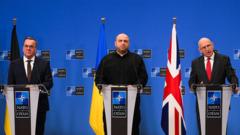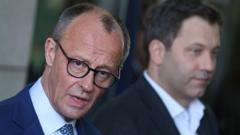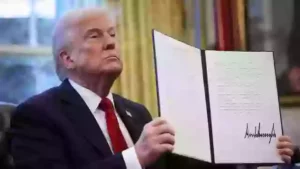Facing economic and security challenges, Germany’s new coalition marks a significant shift in leadership with Merz's conservative approach at the forefront.
Coalition Agreement Paves the Way for Friedrich Merz as Germany's Chancellor

Coalition Agreement Paves the Way for Friedrich Merz as Germany's Chancellor
In a swift political maneuver, Germany’s centrist parties unite to support Friedrich Merz amid European uncertainties.
Germany’s political landscape shifted dramatically on Wednesday as centrist parties struck a coalition agreement, enabling Friedrich Merz to ascend to the role of Chancellor. The swift negotiations concluded in roughly six and a half weeks, a remarkable feat given the backdrop of turmoil enveloping Europe’s economy and security.
Merz, who leads the conservative Christian Democrats and emerged victorious in the February elections, has been under immense pressure to establish a functional government in light of rising tensions. The escalating trade disputes initiated by the Trump administration, along with a more assertive Russia, have left Europe navigating uncharted waters.
During the interim period, Merz boldly utilized his limited influence, advocating for increased debt limits in Parliament to funnel additional funds into military and infrastructure investments, a move aimed at fortifying Germany’s position on the global stage. Historically, this coalition agreement, finalized more quickly than any since Angela Merkel’s second term in 2009, demonstrates a commitment to decisive governance in challenging times.
Despite this apparent unity, the far-right Alternative for Germany party's surge in popularity remains a complicating factor. Nonetheless, major parties have ruled out cooperation with them, citing concerns over democratic integrity.
As the new coalition prepares for implementation, Merz expressed a desire to shape Germany's direction amidst unpredictable global changes.
Merz, who leads the conservative Christian Democrats and emerged victorious in the February elections, has been under immense pressure to establish a functional government in light of rising tensions. The escalating trade disputes initiated by the Trump administration, along with a more assertive Russia, have left Europe navigating uncharted waters.
During the interim period, Merz boldly utilized his limited influence, advocating for increased debt limits in Parliament to funnel additional funds into military and infrastructure investments, a move aimed at fortifying Germany’s position on the global stage. Historically, this coalition agreement, finalized more quickly than any since Angela Merkel’s second term in 2009, demonstrates a commitment to decisive governance in challenging times.
Despite this apparent unity, the far-right Alternative for Germany party's surge in popularity remains a complicating factor. Nonetheless, major parties have ruled out cooperation with them, citing concerns over democratic integrity.
As the new coalition prepares for implementation, Merz expressed a desire to shape Germany's direction amidst unpredictable global changes.





















